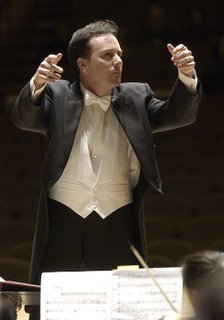 Ryan Brown, director of Opera Lafayette |
The legendary seducer of women is likely a folk myth in origin, but we generally trace him first in literature to a play by Tirso de Molina (né Gabriel Téllez) called El burlador de Sevilla y convidado de piedra (The Trickster of Seville and the Stone Guest), from 1630. As described by Charles C. Russell in his book The Don Juan Legend before Mozart (University of Michigan Press, 1993), the story was a popular source for opera libretti before Mozart and Da Ponte got to it. What this selection of excerpts from Don Juan operas before Don Giovanni showed was what we have known for some time: while Mozart and Da Ponte's work relied on its predecessors, some more heavily than others, it far exceeded them in terms of dramatic ingenuity and musical brilliance.
Gluck, Don Juan, English Baroque Soloists, John Eliot Gardiner Gazzaniga, Don Giovanni, RCA Italiana, Herbert Handt Mozart, Don Giovanni, Freiburger Barockorchester, René Jacobs |
The earliest opera selected here was Alessandro Melani's L'Empio Punito (1669, Rome). It featured two talented singers from the University of Maryland and a chamber assortment of instruments, including Ryan Brown on first violin. Adria McCulloch (the best part of a recent performance of Gluck's Armide) brought her powerful, dark soprano to the role of Atamira (who corresponds to Mozart's Donna Elvira), and Meghan McCall (reviewed last spring in Conrad Susa's Transformations) as Acrimante, the first Don Juan of the evening, a clear, silvery treble. The two gave a lovely performance in one of the opera's simple but effective duets (Assistimi Amore / Resisti mio core), while effervescent tenor Jean-Paul Fouchécourt camped it up in an aria for Delfa, an old woman who has also fallen for Acrimante. The most beautiful piece from this opera was Acrimante's slow minor-key aria Se d'Amor la cruda sfinge, sung with clarity by McCall and a heart-rending manipulation of the clashing dissonances between the two violin parts.
The major discovery of the concert was a new transcription of a section of Gioacchino Albertini's Il Don Giovanni (Warsaw, 1780), based on a manuscript given to Ryan Brown by Charles C. Russell (whose book was cited above -- hooray, musicology!). Far beyond the musicological interest (which made the scholarly side of my heart sing), the buffo escapades of bass-baritone François Loup as Ercolino (Leporello) made this modern premiere such a lark. With the imprecision of his now-tired high baritone range aside, Loup's rabid patter and falsetto imitation of a castrato (part of an extended monologue to entertain baritone William Sharp's Don Giovanni) were hysterical.
 Jean-Paul Fouchécourt, tenor |
Finally, the Mozart selection took up exactly where the Gazzaniga left off, with Don Ottavio consoling Donna Anna and swearing to avenge her father's murderer. Surely, somewhere in the background of this performance was the groundbreaking recording of Don Giovanni released last fall by René Jacobs and the Freiburger Barockorchester. Once you have heard the more transparent orchestral texture of the score when played by original instruments, it is hard to go back to modern ones, although Brown happily eschewed the ultra-fast tempi for many numbers that Jacobs chose.
Anne Midgette, A Long Line of 'Don Giovannis' (Washington Post, March 11) |
Opera Lafayette's 2008-2009 season has not been fully announced yet, but it will feature the modern American premiere of Pierre-Alexandre Monsigny's Le Déserteur (1769), to be presented both here and in New York. The group will also make its Kennedy Center debut.
No comments:
Post a Comment